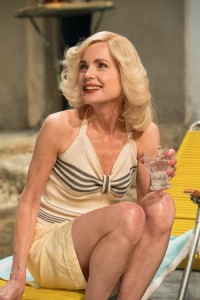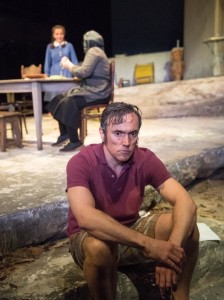No end in sight
by Mika Provata-Carlone
Sunset at the Villa Thalia © NT Graphic Design Studio” width=”270″ height=”381″>
Performance dates and ticket informationSunset at the Villa Thalia by Alexi Kaye Campbell.
Dorfman/National Theatre
“Decision time. Have you chosen hope or fear?” says one of the characters in Alexi Kaye Campbell’s brilliant new play. That character is a forty-something American known simply as ‘Harvey’ and played electrifyingly by Ben Miles. Harvard man extraordinaire, US State Department ‘floater’, man of clandestine missions and even murkier secrets, certainly man-about-town, Harvey addresses the question with all the suave bullishness of the most hardened salesman to Theo (an excellent Sam Crane) and Charlotte (a perfectly unflappable Pippa Nixon). Thirty-something Theo and Charlotte are a Patrick Leigh Fermor-style English couple, the idyllic combination of Writer and Muse-cum-charming-wife, who have newly acquired a strange, inexplicable taste for all things Greek (well, sort of). Hope in Harvey’s jargon is Greece cheap on the market; fear is any residual bourgeois, Old European sense of guilt about buying something worth more than the sum of its parts for next to nothing.
Ancient, modern or both, Greece as a literary topos is loaded with allusions, metaphorical denotations and symbolic pathos. From Ovid’s Arcadian musings to Goethe, Byron and the various peregrinators of the Grand Tour, then writers as diverse as Virginia Woolf, Henry James, Nikos Kazantzakis, Henry Miller, John Fowles, Patrick Leigh Fermor, George Seferis or Peter Shaffer, countless idealised poetasters and wily tricksters have mingled and interchanged on imaginary or real Greek soil in an infinite variety of darkness and light, drama and bathos, laughter and pain – as closely welded together as “bread and butter. Whiskey and soda. Cheese and pickle” in the words of Harvey and Theo. In Kaye Campbell’s hands, Greece is a place of fusion and fission, as well as the catalyst that separates but also elucidates, purifies, redeems what was tarnished or taken for lost.
Sunset at the Villa Thalia is an uproarious comedy – and a heart-rending tragedy. It is a riveting and inglorious depiction of hard-set stereotypes: of the British abroad, a new breed of colonialism without strings or strains attached; of the Americans as stewards of a global community that presumably should not require the weight of a past, or of identity, only steely unilateral force (impersonated with superb ambiguity in the character of Harvey) and delightful and charming frivolity (a delicious, hilarious, utterly unexpected peroxide blonde Elizabeth McGovern); of the Greeks as the grey ghosts of their own past, as the eternally misunderstood latecomers of modernity, as the last tribe of noble savages on the road to perdition or irrevocable change.
What is the value of the past and of the present? What are memory, attachment, guilt and innocence? How do we encounter and come to know the Other?”
 Kaye Campbell’s play offers a finely wrought, tightly structured framework for what are perhaps the most vital questions of our civilisation: what is the value of the past and of the present? What are memory, attachment, guilt and innocence? How do we encounter and come to know the Other? What is the price of civic responsibility and duty – what are the aims and conditions of our global community? What is blindness and insight? As Kaye Campbell has said, Greece is “the country that infuriates me but that I also love with a passion” – an echo of George Seferis’ famous line, “wherever I travel, Greece wounds me.”
Kaye Campbell’s play offers a finely wrought, tightly structured framework for what are perhaps the most vital questions of our civilisation: what is the value of the past and of the present? What are memory, attachment, guilt and innocence? How do we encounter and come to know the Other? What is the price of civic responsibility and duty – what are the aims and conditions of our global community? What is blindness and insight? As Kaye Campbell has said, Greece is “the country that infuriates me but that I also love with a passion” – an echo of George Seferis’ famous line, “wherever I travel, Greece wounds me.”
But ultimately this is not a play about Greece. Starkly distilled down to a father and daughter about to emigrate to Australia just as the Junta takes over the country in 1967; a house where people have been born and died and where a yiayia, an archetypal grandmother, has looked after children, trees, bones and stones, as she shells peas at an old rickety table; and especially a terrific diatribe about the theatre and democracy in Ancient Greece from the mouth of Harvard man Harvey, Greece is only a prism – a very sharp, lucid, unflinching prism through which to observe and examine the twentieth century, and its legacy on our simultaneously confusing, cataclysmic and promising twenty-first.
Sunset at the Villa Thalia is on one level a rivetingly staged play full of laughter and welcome astonishment, sharp exchanges, charismatic acting and a perfect entente between the characters. Director Simon Godwin has given the play a gripping, energising pace, while Hildegard Bechtler’s set provides a dynamic subtext through the sharp contrast between the rocky plateau and the looming height of the villa, and especially through the subtly executed transformation of the house from native Greek dwelling to touristy postcard-perfect villa. On another level, the play is a shattering clash between three worlds, three previously available alternatives to existence: a pre-industrial world of roots, history, memory, close-knit families and self-sufficient austerity; also of a sense of destiny and fate; a colonial world, of civilising but also conquering nations; and a world of interventionist politics that often resolve true threats to a global humanity, but equally often raise questions as to means and ultimate aims, or the multiplying effect of minor and major errors.
Kaye Campbell does not accuse or exonerate; there are no clear-cut villains and innocent victims; like an ancient dramaturge, he conjures up conundrums and human individuals before our eyes, involves us in the empathy, catharsis, fear and awe on the stage – and especially in our souls. The play’s two chronologies, 1967 and 1976, mark moments of history – Greek as well as international, a cold war at the beginning and a transitional ever after – but also the symbolic reversal that took place: as numerical figures swap places, global hierarchies, moralities and principles also switch ranks of significance. At the end of the play beginnings and endings will have to be reassessed, the ordinary and the extraordinary redefined. What started as a mythic journey into the unknown becomes a terminus of both dreams and realisations. The muses slip through Theo’s fingers, politics through Harvey’s, or perhaps ghosts will simply not die, just as old stones will not yield their memory. Sunset at the Villa Thalia is a dirge as well as a comic song; above all it is a sparkling gem, not to be missed.
 Mika Provata-Carlone is an independent scholar, translator, editor and illustrator, and a contributing editor to Bookanista. She has a doctorate from Princeton University and lives and works in London.
Mika Provata-Carlone is an independent scholar, translator, editor and illustrator, and a contributing editor to Bookanista. She has a doctorate from Princeton University and lives and works in London.
Sunset at the Villa Thalia by Alexi Kaye Campbell continues at the Dorfman/National Theatre to 4 August. Tickets £15 to £55.
More info
Join Simon Godwin and Alexi Kaye Campbell at the Dorfman Theatre in a Platform Talk about the play chaired by Rosie Goldsmith at 6pm on Friday 17 June.
Tickets £5/£4 concessions.
More info

